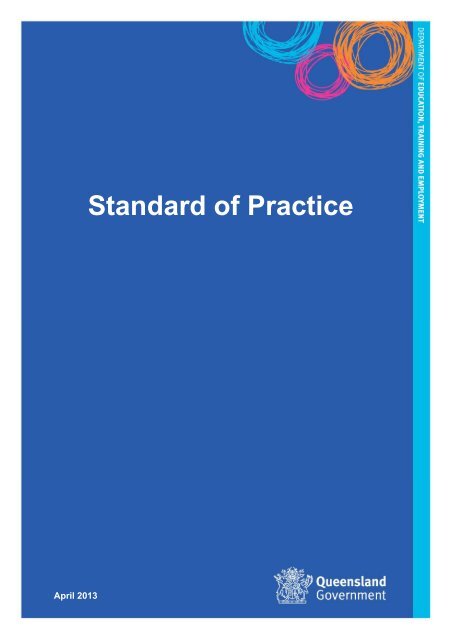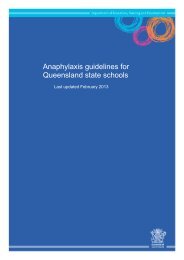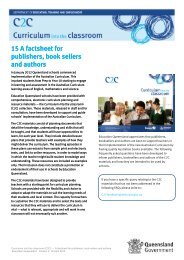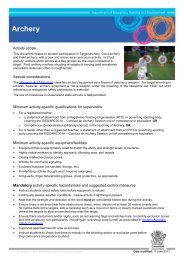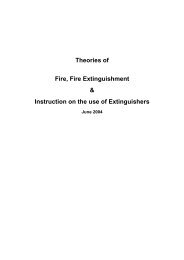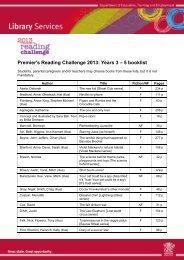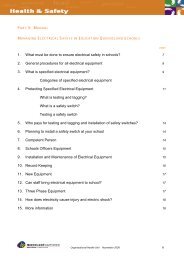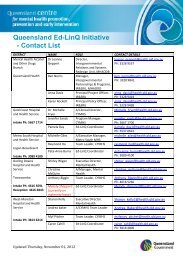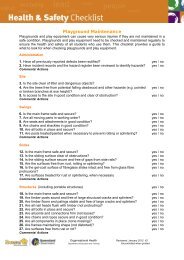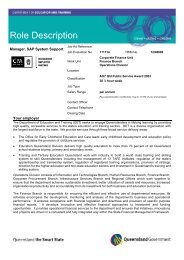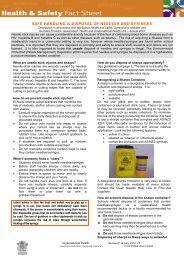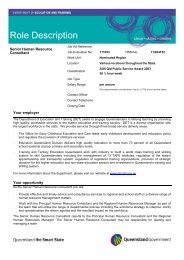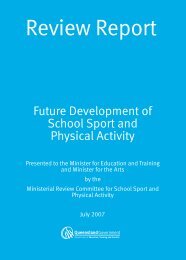DETE code of conduct - standard of practice - Education Queensland
DETE code of conduct - standard of practice - Education Queensland
DETE code of conduct - standard of practice - Education Queensland
Create successful ePaper yourself
Turn your PDF publications into a flip-book with our unique Google optimized e-Paper software.
April 2013<br />
Standard <strong>of</strong> Practice
MESSAGE FROM THE DIRECTOR-GENERAL<br />
One <strong>of</strong> the strengths <strong>of</strong> the Department <strong>of</strong> <strong>Education</strong>, Training and Employment (<strong>DETE</strong>) is its<br />
employees’ strong commitment to providing excellent education and training to people <strong>of</strong> all ages.<br />
The contribution each employee makes to supporting and delivering these services makes a<br />
difference to the future wellbeing <strong>of</strong> children, young people and adults, to the social and<br />
economic success <strong>of</strong> <strong>Queensland</strong>, and to the future <strong>of</strong> our nation.<br />
Our pr<strong>of</strong>essionalism and high <strong>standard</strong> <strong>of</strong> ethical <strong>conduct</strong> is shown in all our work activities and is<br />
supported in this Standard <strong>of</strong> Practice by a clear statement <strong>of</strong> what is expected <strong>of</strong> us and is<br />
aligned to the Code <strong>of</strong> Conduct for the <strong>Queensland</strong> Public Service which assists employees in<br />
supporting ethical <strong>standard</strong>s <strong>of</strong> behaviour and expectations across government.<br />
This Standard <strong>of</strong> Practice does not cover every possible scenario but provides further guidance<br />
on the intention <strong>of</strong> the four ethics principles:-<br />
1. Integrity and impartiality<br />
2. Promoting the public good<br />
3. Commitment to the system <strong>of</strong> government<br />
4. Accountability and transparency<br />
This Standard <strong>of</strong> Practice helps us deliver on these fundamental principles. It also provides<br />
advice and guidance for employees in making ethical decisions, especially in circumstances<br />
where the ‘correct’ or ‘best’ course <strong>of</strong> action may not be clear.<br />
I consider it essential and therefore mandatory that all staff not only read this Standard <strong>of</strong> Practice<br />
in conjunction with the Code <strong>of</strong> Conduct for the <strong>Queensland</strong> Public Service but also undertake<br />
and maintain up to date training to develop a clear understanding <strong>of</strong> the ethical principles, values<br />
and <strong>standard</strong>s <strong>of</strong> <strong>conduct</strong> that support our daily work in the Department.<br />
Annette Whitehead<br />
Director-General, <strong>Education</strong>, Training and Employment<br />
2 | P age
The section numbering in this document aligns with the section numbering <strong>of</strong> the Code <strong>of</strong><br />
Conduct for the <strong>Queensland</strong> Public Service<br />
1 Integrity and impartiality<br />
The Public Sector Ethics Act 1994 states:<br />
Recognising that public <strong>of</strong>fice involves a public trust, public sector entities seek to promote<br />
confidence in the integrity <strong>of</strong> the public service and:<br />
a. are committed to the highest ethical <strong>standard</strong>s<br />
b. accept and value their duty to provide advice which is objective, independent, apolitical<br />
and impartial<br />
c. acknowledge the primacy <strong>of</strong> the public interest and undertake that any conflict <strong>of</strong> interest<br />
issue will be resolved or appropriately managed in favour <strong>of</strong> the public interest<br />
d. demonstrate respect for all persons, including towards employees, clients and the general<br />
public, and<br />
e. are committed to honest, fair and respectful engagement with the community.<br />
1.2 Manage conflicts <strong>of</strong> interest<br />
Other (secondary) employment<br />
It is important to recognise that concurrent employment in both the public and private sector may<br />
give rise to a real (actual) or perceived conflict <strong>of</strong> interest. Whilst it is not prohibited to engage in<br />
other employment concurrent to your employment with the Department, you must ensure that you<br />
meet your obligations under the Code <strong>of</strong> Conduct and this Standard <strong>of</strong> Practice particularly those<br />
regarding use <strong>of</strong> <strong>of</strong>ficial information and resources, and managing conflicts <strong>of</strong> interest.<br />
Departmental staff engaged in other employment that may present a real or perceived conflict <strong>of</strong><br />
interest according to the Notification <strong>of</strong> other employment procedure must submit a Notification<br />
<strong>of</strong> Other Employment form to their supervisor or manager. The Public Service Commission<br />
Directive 3/10: Declaration <strong>of</strong> Interest – Public Service Employees (other than departmental Chief<br />
Executives) provides further clarification <strong>of</strong> matters which must be disclosed.<br />
If engaged in concurrent employment, you have an ethical obligation to ensure your ability to fulfil<br />
your duties with your primary employment is not adversely affected and the integrity <strong>of</strong> the<br />
Department is not compromised. You must also ensure you do not use your position as a public<br />
<strong>of</strong>ficial, public resources, facilities or intellectual property to advise, promote or benefit your<br />
private interests either financially or in kind.<br />
Employees must not engage another employee or allow themselves to be separately engaged by<br />
the Department to provide goods or services that could reasonably be expected to be provided as<br />
part <strong>of</strong> their <strong>standard</strong> paid employment.<br />
Employees with private interests should be mindful that the law precludes them, in certain<br />
circumstances from being contracted to their employer. If you are considering engaging in<br />
3 | P age
usiness with <strong>DETE</strong>, it is incumbent on you to seek advice before signing contracts or<br />
agreements, which may inadvertently breach the law. Managers or those <strong>of</strong>ficers responsible for<br />
the management <strong>of</strong> contracts with staff, who are already employed in any capacity, should<br />
similarly seek advice from the Ethical Standards Unit. Section 89 <strong>of</strong> the Criminal Code provides,<br />
‘Any person who, being employed in the public service, knowingly acquires or holds, directly or<br />
indirectly’ … ‘a private interest in any contract or agreement which is made on account <strong>of</strong> the<br />
public service with respect to any matter concerning the Department <strong>of</strong> the service in which the<br />
person is employed, is guilty <strong>of</strong> a misdemeanour, and is liable to imprisonment for 3 years, and to<br />
be fined at the discretion <strong>of</strong> the court’.<br />
Example: Inappropriate action and appropriate response - Other (secondary) employment<br />
In addition to performing full-time employment for the Department, an employee worked the<br />
10.00pm to 6.00am taxi shift on three week-nights. The employee was observed seemingly<br />
asleep at various times during their working day.<br />
The employee explained they were experiencing significant financial difficulties. The supervisor<br />
assisted the employee to contact a financial counsellor and agreement was reached that the<br />
employee would only drive a taxi on Friday and Saturday nights.<br />
1.5 Demonstrate a high <strong>standard</strong> <strong>of</strong> workplace behaviour and<br />
personal <strong>conduct</strong><br />
Fitness for duty<br />
You are to obey the law regarding the possession or use <strong>of</strong> illicit drugs.<br />
If you are using medication that may affect your work performance you should notify your<br />
supervisor or manager. If you are a supervisor or manager, you will need to consider the options<br />
available for assisting an employee who may be required to take legally prescribed drugs and<br />
whose level <strong>of</strong> performance may become impaired.<br />
You are not to consume alcohol or be under the influence <strong>of</strong> alcohol when performing your duties<br />
generally and in particular when you have responsibility for the care <strong>of</strong> students. For example: at<br />
a state educational facility; or outside <strong>of</strong> a state educational facility on a camp, excursion or study<br />
tour.<br />
Should you be suffering from a drug or alcohol problem that adversely affects your work<br />
performance you must actively seek pr<strong>of</strong>essional assistance to correct the problem.<br />
Conflict resolution<br />
Actively manage workplace conflict you may become involved in. For those in a supervisory role<br />
you also have the responsibility to manage workplace conflict between employees under your<br />
supervision to create positive and constructive outcomes.<br />
4 | P age
Example: Managing conflict resolution - Appropriate response<br />
A new employee with strong views on a number <strong>of</strong> issues joins a work team. Another employee<br />
strongly expresses alternative views. Both employees seek to understand the basis for their<br />
different viewpoints and are acting appropriately in demonstrating their responsibility as<br />
individuals to manage conflict situations in a respectful manner.<br />
Another employee takes <strong>of</strong>fence at the new employee's views and privately decides to avoid all<br />
contact with that employee. This breakdown in communication adversely affects the information<br />
sharing process within the work unit and is not appropriate. The supervisor <strong>of</strong> the work unit<br />
identifies the difficulty and introduces strategies to address the impediment, to open<br />
communication and relationship building. It is important that the supervisor intervenes<br />
appropriately so that the situation is not escalated.<br />
Use <strong>of</strong> social media<br />
Personal use <strong>of</strong> social media<br />
Social media may include social networking sites such as, Facebook, Myspace, or Linkedin. It<br />
can also include instant messaging (SMS), geo-spatial tagging such as, Foursquare and video or<br />
photo sharing websites such as, Youtube. The Department recognises that you may use these<br />
and other social media in your personal time (outside <strong>of</strong> working hours) and does not intend to<br />
discourage nor unduly limit your personal communications or online activities. However, you<br />
should recognise the potential for damage to be caused (either directly or indirectly) to the<br />
Department and possibly other client groups in certain circumstances through personal use <strong>of</strong><br />
social media, particularly, if you can be identified as a departmental employee. Therefore, you<br />
should be aware <strong>of</strong> the risks and ensure that any risk <strong>of</strong> damage or detriment is minimised. You<br />
are responsible for the content you publish from your social media platform.<br />
You should not:<br />
Post material that is, or might be construed as, threatening, harassing, bullying,<br />
discriminatory or disparaging towards another employee <strong>of</strong> the Department.<br />
Imply that you are authorised to speak on behalf <strong>of</strong> the Department or the government, or<br />
give the impression that any views you express are those <strong>of</strong> the Department or the<br />
government.<br />
Use or disclose any confidential information or personal information obtained in your<br />
capacity as an employee <strong>of</strong> the Department.<br />
Reasonable/unreasonable personal use <strong>of</strong> departmental ICT facilities and devices,<br />
including intranet, extranet, internet and network access and usage<br />
Staff can use departmental ICT networks for “limited personal use”, which means infrequent and<br />
brief, generally occurring during personal time, for example during a lunch break. Limited<br />
personal use does not include use for private business dealings; personal gain or pr<strong>of</strong>it that may<br />
impede the efficiency <strong>of</strong> the intranet, internet or email services, or that would violate or breach<br />
any State or Federal legislation and regulation.<br />
5 | P age
When accessing social media via the Department's Internet, intranet and extranet systems, you<br />
must do so in accordance with the Department’s procedure Using the Department's corporate<br />
ICT network, which requires you to use these resources ‘reasonably’, in a manner that does not<br />
interfere with your work, and is not inappropriate or excessively accessed.<br />
Examples <strong>of</strong> reasonable use would include:<br />
Briefly email a family member or friend using appropriate content during your personal<br />
time. E.g. lunch break<br />
Doing online banking or paying your bills online<br />
Accessing breaking news or other online media sites<br />
Examples <strong>of</strong> unreasonable use would include:<br />
Access to or the posting <strong>of</strong> any material that is fraudulent, harassing, threatening, bullying,<br />
embarrassing, sexually explicit, pr<strong>of</strong>ane, obscene, racist, sexist, intimidating, defamatory<br />
or otherwise inappropriate or unlawful<br />
Using the Department’s Internet and computer resources to provide comments to<br />
journalists, politicians and lobby groups other than in the course <strong>of</strong> their <strong>of</strong>ficial duties<br />
Spending extended periods <strong>of</strong> time during working hours using social media that is not<br />
related to your work<br />
Protecting students from harm<br />
Interactions with students<br />
All students have a fundamental right to a safe and trusted physical and emotional environment<br />
that is free from harm. Departmental employees hold a special position <strong>of</strong> trust arising from the<br />
nature <strong>of</strong> the work. As employees we exercise powers that have a significant impact on the lives<br />
<strong>of</strong> students and consequently there is a community expectation that these powers will be properly<br />
and prudently used. Therefore, employees should strive to establish, build and maintain positive<br />
relationships with students so that the self-esteem and social development <strong>of</strong> students are<br />
enhanced.<br />
Employees must actively seek to prevent harm to students and support those students who have<br />
been harmed.<br />
Employees must read, understand, and comply with the Department's Allegations against<br />
employees in the area <strong>of</strong> student protection procedure and the Student Protection procedure, and<br />
be aware <strong>of</strong> their duty <strong>of</strong> care at common law. Employees must be aware <strong>of</strong> their responsibilities<br />
in preventing and responding to harm or risk <strong>of</strong> harm to all students.<br />
An employee must not impose corporal punishment on a student in the course <strong>of</strong> their<br />
pr<strong>of</strong>essional duties.<br />
An employee must not misuse their pr<strong>of</strong>essional relationship with a student for personal or private<br />
gain.<br />
Employees should strive to establish, build and maintain positive relationships with students so<br />
that the self-esteem and social development <strong>of</strong> students are enhanced.<br />
6 | P age
Inappropriate student interactions<br />
Examples <strong>of</strong> inappropriate interactions (behaviours that raise a reasonable suspicion that the<br />
<strong>standard</strong>s applying to the pr<strong>of</strong>essional employee - student relationship have or may be breached)<br />
include:<br />
<br />
<br />
<br />
<br />
<br />
<br />
<br />
<br />
<br />
<br />
flirtatious behaviour directed towards a student<br />
dating a student<br />
spending significant time alone with a student other than to perform one’s pr<strong>of</strong>essional<br />
duties or without reasonable explanation<br />
expressing romantic feelings towards a student in written or other form<br />
private live chat conversations on the Internet with students e.g. Facebook, SMS<br />
providing a personal mobile or home telephone number to students; other than for<br />
justifiable educational or safety purposes<br />
taking students for c<strong>of</strong>fee, the movies or other social events alone<br />
disregarding appropriate physical distances from students; other than for justifiable<br />
educational or safety purposes<br />
using disrespectful language, including swearing, either directed at, or in the presence <strong>of</strong><br />
students<br />
privately giving a student money or a gift<br />
Sexual mis<strong>conduct</strong><br />
Employees must not engage in behaviour that raises a reasonable suspicion that they have<br />
engaged in or will engage in sexual mis<strong>conduct</strong> with a student, or that the <strong>standard</strong>s applying<br />
pr<strong>of</strong>essional employee/student relations have or will be breached. Employee interactions with<br />
students must be and seen to be pr<strong>of</strong>essional at all times including outside <strong>of</strong> school hours.<br />
Sexual mis<strong>conduct</strong> is defined in the glossary section <strong>of</strong> this Standard <strong>of</strong> Practice.<br />
You must discourage and reject any advances <strong>of</strong> a sexual nature initiated by a student with<br />
whom you have a pr<strong>of</strong>essional relationship, or where a prohibition on sexual <strong>conduct</strong> applies.<br />
Both the Code <strong>of</strong> Conduct for the <strong>Queensland</strong> Public Service and the Standard <strong>of</strong> Practice draw<br />
their legislative authority from Part 4 <strong>of</strong> the Public Sector Ethics Act 1994. This Act, and by<br />
definition both the Code <strong>of</strong> Conduct and Standard <strong>of</strong> Practice, has been interpreted to apply<br />
strictly to employees whilst they are carrying out work related duties or attending work activities.<br />
Whilst inappropriate interactions between employees <strong>of</strong> <strong>DETE</strong> and students outside <strong>of</strong> school<br />
hours remains prohibited, such behaviour where proven may be actionable as a disciplinary<br />
breach referred to as 'mis<strong>conduct</strong>' under section 187(1)(b) <strong>of</strong> the Public Service Act 2008.<br />
Section 187(4) (b) defines mis<strong>conduct</strong> to include, inappropriate or improper <strong>conduct</strong> in a private<br />
capacity that reflects seriously and adversely on the public service.<br />
Exemption<br />
The following scenarios relating to pre-existing relationships which are exempt from the general<br />
prohibition <strong>of</strong> sexual mis<strong>conduct</strong> and related behaviour:<br />
7 | P age
a person who is in a lawful private relationship commences employment with the<br />
Department and the continuation <strong>of</strong> the relationship would normally contravene this<br />
Standard <strong>of</strong> Practice<br />
a change <strong>of</strong> circumstances meaning an employee who is in a lawful private relationship<br />
that does not contravene this Standard <strong>of</strong> Practice is now in a relationship that would<br />
contravene this Standard <strong>of</strong> Practice - for example, their partner begins studying at the<br />
school where they work<br />
These exceptions to the general prohibition are subject to the employee immediately declaring<br />
the relationship or change in circumstances to the Director, Ethical Standards Unit. Failure to<br />
make this declaration may be cause for disciplinary action.<br />
Following a confidential declaration, the Department will cooperate with the employee to resolve<br />
any real or perceived conflict <strong>of</strong> interest to enable the relationship to continue. However, any real<br />
or perceived conflict <strong>of</strong> interest between your private relationship and the performance <strong>of</strong> work<br />
duties must be resolved in favour <strong>of</strong> the public interest.<br />
The Department will respect the privacy <strong>of</strong> the relationship and maintain the confidentiality <strong>of</strong> the<br />
declaration, within the law. If a person makes an honest complaint or notifies the Department in<br />
good faith about suspected sexual mis<strong>conduct</strong> between an employee and a student, the<br />
Department is required to advise the complainant/notifier (if known) that it has acknowledged the<br />
relationship, because it fell within the exceptional category <strong>of</strong> a pre-existing relationship.<br />
Examples <strong>of</strong> a change <strong>of</strong> circumstances to a pre-existing private/sexual relationship<br />
requiring confidential declaration<br />
<br />
<br />
A teacher is in a lawful private/sexual relationship with a 17 year old student from a nonstate<br />
school or private educational facility, which does not contravene this Standard <strong>of</strong><br />
Practice. The student then enrols in a state educational facility.<br />
A cleaner is in a lawful private/sexual relationship with a 16 year old student that does not<br />
contravene this Standard <strong>of</strong> Practice. The student then enrols in the state educational<br />
facility where the cleaner works.<br />
An employee suspects an inappropriate relationship between another employee and a student<br />
and reports the matter as suspected sexual mis<strong>conduct</strong>. If that employee is advised by the<br />
Department that it is an acknowledged relationship, then the employee must respect the<br />
confidentiality <strong>of</strong> this advice.<br />
Electronic communication/social networking<br />
All telephone, email, SMS and other social networking contact by employees with students must<br />
be authorised by the principal or manager. Records <strong>of</strong> the approval and the nature <strong>of</strong> the<br />
communication should be kept on file by the principal or manager who will advise the<br />
parent/custodian <strong>of</strong> the communication as appropriate.<br />
The following <strong>standard</strong>s relate to all employees who have any form <strong>of</strong> contact with students.<br />
Unless in exceptional circumstances, electronic communication with students, particularly those<br />
under 18 years <strong>of</strong> age, is unacceptable unless:<br />
8 | P age
for justifiable appropriate educational reasons; or<br />
approval is gained from the employee’s principal or manager.<br />
A record <strong>of</strong> the approval is to be kept by the employee and the employee’s principal or manager.<br />
Communication must not occur with students using a personal or departmental mobile phone,<br />
either verbally or by text message unless:<br />
for justifiable appropriate educational reasons; or<br />
prior approval has been given by the employees principal or manager.<br />
A record <strong>of</strong> the approval is kept by the employee and the employee’s principal or manager.<br />
Communication must not occur with students from a private or personal email address.<br />
Departmental policies allowing for communication with students via departmental email states<br />
that communication must be for <strong>of</strong>ficial purposes.<br />
Employees must not use personal social networking sites including Facebook and Twitter, to<br />
contact or access students enrolled in any state educational facility. Employees must discourage<br />
students from communicating with them in this manner.<br />
Employees must not use any <strong>of</strong>ficial departmental social media site for inappropriate or non-work<br />
related communication. They must only establish an <strong>of</strong>ficial social media presence / site with<br />
approval from their principal or manager.<br />
Employees must not use personal cameras or mobile phones to photograph students unless prior<br />
approval has been given by their principal or manager. The use <strong>of</strong> a personal or departmental<br />
mobile phone or camera to photograph students must be for <strong>of</strong>ficial purposes only. Parental or<br />
custodial approval must be given for the publication <strong>of</strong> photographs <strong>of</strong> students.<br />
Interactions with parents/caregivers<br />
Employees should be responsive to all reasonable requests <strong>of</strong> parents or caregivers in relation to<br />
their children's education and should encourage pr<strong>of</strong>essional partnerships that create optimal<br />
learning environments and opportunities for students under the age <strong>of</strong> 18 years.<br />
Employees should engage in open and pr<strong>of</strong>essional communication with parents/caregivers and<br />
report on a student's achievements and learning options in a way that promotes successful<br />
educational outcomes.<br />
Any conflict <strong>of</strong> interest that arises between an employee's private relationship with a student's<br />
parent/caregiver and the impartial performance <strong>of</strong> their work duties should be avoided or resolved<br />
in the best interests <strong>of</strong> the student.<br />
Leadership and supervisory behaviour<br />
Employees should be encouraged to demonstrate leadership in the performance <strong>of</strong> their work<br />
duties. Employees who supervise the work <strong>of</strong> other employees (or other people, such as student<br />
teachers or volunteers) have further important responsibilities.<br />
Supervisors should:<br />
9 | P age
set the <strong>standard</strong> <strong>of</strong> ethical <strong>conduct</strong> by encouraging and promoting behaviour consistent<br />
with this Standard <strong>of</strong> Practice<br />
treat employees fairly, equitably, with consistency and respect<br />
ensure that all employees are made aware <strong>of</strong> their responsibilities under this Standard <strong>of</strong><br />
Practice and any legislation, policies and procedures relevant to their duties<br />
ensure that the Department's policy and procedural requirements are met<br />
ensure that demands placed on employees are reasonable in the circumstances (e.g.<br />
employees have sufficient resources, assistance and/or skills to perform the work, and<br />
are given appropriate support)<br />
maintain open, honest and thorough communication with all employees<br />
ensure all employees understand the <strong>standard</strong>s <strong>of</strong> <strong>conduct</strong> expected <strong>of</strong> them<br />
monitor their own performance as managers or supervisors to ensure their performance is<br />
making a positive contribution to the Department and work environment<br />
ensure workloads are equitably distributed amongst team members.<br />
Private <strong>conduct</strong><br />
The Code <strong>of</strong> Conduct does not cover mis<strong>conduct</strong> in a private capacity; however, private <strong>conduct</strong><br />
that is mis<strong>conduct</strong> is defined under section 187 (4) (b) <strong>of</strong> the Public Service Act 2008 as<br />
inappropriate or improper <strong>conduct</strong> in a private capacity that reflects seriously and adversely on<br />
the public service and in this capacity mis<strong>conduct</strong> is subject to disciplinary action under section<br />
187(1) (b) Public Service Act 2008.<br />
Personal appearance<br />
Dress, personal appearance and hygiene are important elements <strong>of</strong> pr<strong>of</strong>essional presentation.<br />
Employees must ensure their personal appearance and presentation is clean, tidy and<br />
appropriate for their work role and environment.<br />
Employees who wear a uniform or other apparel identifying them as an employee <strong>of</strong> the<br />
Department must ensure that the uniform or apparel is clean, complete and in good order. If an<br />
employee is wearing a departmental uniform, or is otherwise identifiable as a departmental<br />
employee while <strong>of</strong>f duty, they are expected to avoid <strong>conduct</strong> which may adversely affect the<br />
image <strong>of</strong> the Department.<br />
2 Promoting the public good<br />
The Public Sector Ethics Act 1994 states:<br />
Recognising that the public sector is the mechanism through which the elected representatives <strong>of</strong><br />
the people <strong>of</strong> <strong>Queensland</strong> deliver programs and services for the benefit to the people <strong>of</strong><br />
<strong>Queensland</strong>, public sector entities:<br />
a. accept and value their duty to be responsive to both the requirements <strong>of</strong> government and<br />
to the public interest<br />
b. accept and value their duty to engage the community in developing and effecting <strong>of</strong>ficial<br />
public sector priorities, policies and decisions<br />
10 | P age
c. accept and value their duty to manage public resources effectively, efficiently and<br />
economically<br />
d. value and seek to achieve excellence in service delivery, and<br />
e. value and seek to achieve enhanced integration <strong>of</strong> services to better service clients.<br />
3 Commitment to the system <strong>of</strong> government<br />
The Public Sector Ethics Act 1994 states:<br />
Recognising that they have a duty to uphold the system <strong>of</strong> government and the laws <strong>of</strong> the State,<br />
Australia and local government, public sector entities:<br />
a. accept and value their duty to uphold the system <strong>of</strong> government and the laws <strong>of</strong> the State,<br />
Australian and local government<br />
b. are committed to supporting <strong>of</strong>ficial public sector priorities, policies and decisions<br />
pr<strong>of</strong>essionally and impartially, and<br />
c. accept and value their duty to operate within the framework <strong>of</strong> Ministerial responsibility to<br />
government, Parliament and the community.<br />
4 Accountability and transparency<br />
The Public Sector Ethics Act 1994 states:<br />
Recognising that public trust in public <strong>of</strong>fice requires high <strong>standard</strong>s <strong>of</strong> public administration,<br />
public sector entities:<br />
a. are committed to exercising proper diligence, care and attention<br />
b. are committed to using public resources in an effective and accountable manner<br />
c. are committed to managing information as openly as practicable within the legal<br />
framework<br />
d. value and seek to achieve high <strong>standard</strong>s <strong>of</strong> public administration<br />
e. value and seek to innovate and continuously improve performance, and<br />
f. value and seek to operate within a framework <strong>of</strong> mutual obligation and shared<br />
responsibility between public sector entities and public <strong>of</strong>ficials.<br />
4.1 Ensure diligence in public administration<br />
Disclosing fraud, corruption, maladministration, <strong>of</strong>ficial mis<strong>conduct</strong>,<br />
mis<strong>conduct</strong>, waste <strong>of</strong> public funds, or risk to public health or safety<br />
A public interest disclosure (PID) is a disclosure <strong>of</strong> certain information made by a public <strong>of</strong>ficial or<br />
any person about a wrongdoing in the public sector, to the Department. Reporting suspected<br />
wrongdoing is vital to the integrity <strong>of</strong> the Department and the <strong>Queensland</strong> Public Sector.<br />
11 | P age
The Public Interest Disclosure Act 2010 provides a framework on who can make a disclosure <strong>of</strong><br />
wrongdoing; the types <strong>of</strong> matters that can be disclosed; how PIDs can be managed; and how<br />
protections can be <strong>of</strong>fered to those persons who make a PID. Employees must follow<br />
departmental procedures and guidelines for making and managing a public interest disclosure if<br />
they are reporting a suspected wrongdoing.<br />
Employees must report knowledge <strong>of</strong> suspected wrongdoing in the workplace to an appropriate<br />
public sector entity or proper authority authorised to receive such information. Reports <strong>of</strong> alleged<br />
wrongdoing could be about public service fraud, corruption, maladministration, <strong>of</strong>ficial mis<strong>conduct</strong>,<br />
mis<strong>conduct</strong> and reprisal action, negligent or improper management resulting in waste <strong>of</strong> public<br />
resources, substantial or specific danger to persons with a disability or the environment in the<br />
public interest. As an employee, to report this type <strong>of</strong> wrongdoing about a public <strong>of</strong>ficial is to<br />
make a PID.<br />
Employees must not engage in intimidating or harassing behaviour, adverse discrimination or<br />
treatment, or cause damage to the reputation <strong>of</strong> an employee or any person because that person<br />
has appropriately disclosed a wrongdoing or has evidence <strong>of</strong> wrongdoing.<br />
Employees must not knowingly make a false or misleading statement concerning an allegation <strong>of</strong><br />
improper <strong>conduct</strong> by an employee to a proper authority. Employees must not make a vexatious<br />
complaint about another person.<br />
Under the Crime and Mis<strong>conduct</strong> Act 2001, the Director-General has a responsibility to refer all<br />
matters involving suspected <strong>of</strong>ficial mis<strong>conduct</strong>, including allegations received from anonymous<br />
sources, to the Crime and Mis<strong>conduct</strong> Commission (CMC).<br />
Employees must co-operate with an investigation being <strong>conduct</strong>ed in connection with the<br />
administration, management and operation <strong>of</strong> the Department to ensure the best possible<br />
outcomes.<br />
Employees <strong>of</strong> the Department are obliged, when requested, to participate in an investigation<br />
process as a complainant, subject <strong>of</strong>ficer or witness, either by interview or the provision <strong>of</strong> a<br />
written statement.<br />
Example 1: Reporting suspected <strong>of</strong>ficial mis<strong>conduct</strong> - Appropriate action taken<br />
Two employees attend a workshop interstate, and upon their return to duty lodge travel claims for<br />
expenses to be reimbursed. One employee learns that items and expenses claimed by the other<br />
were not incurred as reported, and therefore has reason to suspect that a knowingly false claim<br />
has been made. The employee reports this to their supervisor. The supervisor advises the Ethical<br />
Standards Unit <strong>of</strong> the employee's report.<br />
Example 2: Making a Vexatious Complaint - Inappropriate Action Taken<br />
Darren's behaviour has been the subject <strong>of</strong> an employee complaint properly lodged by Julie.<br />
Upset at being the subject <strong>of</strong> a complaint, Darren decides to cause Julie distress by lodging a<br />
complaint against her in which he makes allegations <strong>of</strong> improper <strong>conduct</strong> without any reasonable<br />
basis for the complaint.<br />
12 | P age
Employee responsibilities in relation to the investigation <strong>of</strong> suspected<br />
breaches <strong>of</strong> the Code <strong>of</strong> Conduct for the <strong>Queensland</strong> Public Service, Standard<br />
<strong>of</strong> Practice and departmental policies and procedures<br />
All employees are expected to participate in any mis<strong>conduct</strong> investigation authorised under<br />
relevant departmental guidelines.<br />
Participation in this context includes attending, where and when required, an interview and<br />
responding to questions from the relevant authorised <strong>of</strong>ficer in an open and honest manner.<br />
The purpose <strong>of</strong> a mis<strong>conduct</strong> investigation is to determine whether there has been a breach <strong>of</strong><br />
the Code <strong>of</strong> Conduct for the <strong>Queensland</strong> Public Service, Standard <strong>of</strong> Practice and/or<br />
departmental policies and procedures and as such whether the employee is liable to a<br />
disciplinary sanction under the Public Service Act 2008.<br />
An employee's participation in a mis<strong>conduct</strong> investigation process is a requirement under the<br />
Standard <strong>of</strong> Practice and should not be considered voluntary.<br />
4.2 Ensure transparency in our business dealings<br />
Donations and sponsorship<br />
If you receive an <strong>of</strong>fer <strong>of</strong> a donation to the Department, your worksite or school, you should<br />
immediately notify your supervisor. Donations may be accepted on behalf <strong>of</strong> the Department for<br />
departmental use, but must be registered in accordance with the requirements <strong>of</strong> Part 2, <strong>of</strong> the<br />
Financial and Performance Management Standard 2009. When accepting a donation, it should<br />
be made clear to the donor where necessary and appropriate, that acceptance <strong>of</strong> the donation<br />
creates no implicit or explicit obligation upon the Department towards the donor. If the 'gift or<br />
donation' is conditional, it should only be accepted if the conditions do not affect or will not be<br />
seen to have an effect on the impartial performance <strong>of</strong> an employee’s duties.<br />
Acceptance <strong>of</strong> <strong>of</strong>fers <strong>of</strong> sponsorship from individuals and organisations and the soliciting <strong>of</strong><br />
sponsorship for departmental activities must be managed and dealt with in accordance with the<br />
<strong>Queensland</strong> Government Sponsorship Policy.<br />
Example 1: Acceptance <strong>of</strong> a donation for <strong>of</strong>ficial purposes - Appropriate <strong>conduct</strong><br />
An individual <strong>of</strong>fers to donate $1000.00 on the condition that it is spent only on the purchase <strong>of</strong><br />
school library books. The donation is accepted and recorded in the school financial system as the<br />
condition does not affect the impartial performance <strong>of</strong> departmental functions.<br />
Example 2: Offer <strong>of</strong> a donation with unacceptable conditions - Appropriate <strong>conduct</strong><br />
A parent <strong>of</strong>fers to donate $1000.00 to purchase school sporting equipment if the school<br />
guarantees their son will be selected for the school football team. Selection for the football team<br />
is based on a student’s level <strong>of</strong> skill and expertise. The principal declines the <strong>of</strong>fer, advising the<br />
parent <strong>of</strong> the process for selection to the football team and the school's policy on providing equal<br />
opportunity to students.<br />
13 | P age
Receiving prizes and awards in the course <strong>of</strong> duties (from a non-government source)<br />
Should an employee in the course <strong>of</strong> performing their work duties, receive a prize with a value<br />
greater than $150.00, they must declare receipt <strong>of</strong> the prize and forward it to the Department for<br />
management.<br />
Should an employee receive a prize or a gift as an award for significant contribution or excellence,<br />
they must declare receipt <strong>of</strong> such award to their principal or supervisor. If the award is the result<br />
<strong>of</strong> them performing their <strong>of</strong>ficial duties they will generally be permitted to retain the award as long<br />
as there is no conflict <strong>of</strong> interest associated with the retention <strong>of</strong> the award. Principals, directors<br />
and supervisors may seek advice from the Director, Ethical Standards Unit in cases where<br />
employees notify them <strong>of</strong> receiving such awards.<br />
Example: Declaration <strong>of</strong> Receipt <strong>of</strong> Prizes - Appropriate response<br />
An employee attends a workshop in the course <strong>of</strong> performing their work duties and receives a<br />
ticket for a lucky door prize. The employee wins the prize, which is a new computer valued at<br />
$2000.00. The employee declares receipt <strong>of</strong> the prize and forwards the computer to the<br />
Department for management.<br />
During the lunch break at the seminar, the employee attends the local casino and wins $1000.00.<br />
The employee keeps the $1000.00 as the casino visit was in their personal time and not part <strong>of</strong><br />
their work duties.<br />
Appointments to Boards<br />
Public <strong>of</strong>ficials are in a unique position <strong>of</strong> trust and responsibility. In some instances, public<br />
<strong>of</strong>ficials may be appointed by name, as a government or departmental representative to a<br />
government board due to their experience within a Department or the public service, without the<br />
appointment being linked to a specific position.<br />
In these circumstances, public service <strong>of</strong>ficers appointed to government boards as government or<br />
departmental representatives have an ethical obligation to formally resign from such<br />
appointments if they cease employment in the public service or with the Department or agency<br />
relevant to the board position. Enabling legislation will usually specify to whom the resignation<br />
should be tendered. For boards not constituted under legislation and where the Minister is the<br />
appointing authority, a written resignation should be tendered to the Minister. Where there is<br />
doubt to whom the resignation should be tendered, advice should be sought from the Department<br />
responsible for the administration <strong>of</strong> the board.<br />
4.3 Use <strong>of</strong>ficial resources, public property and facilities<br />
appropriately<br />
Post-employment responsibilities<br />
When an employee ceases employment with the Department, they have an obligation to maintain<br />
confidentiality <strong>of</strong> <strong>of</strong>ficial information formerly available to them as a public <strong>of</strong>ficial, and to return<br />
any property belonging to the Department.<br />
14 | P age
Using the departmental Internet, intranet, and electronic mail<br />
In accordance with the <strong>Queensland</strong> Government Information Standard 38 - The Use <strong>of</strong> ICT<br />
Facilities and Devices, an employee may be dismissed if they are found intentionally downloading,<br />
storing or distributing pornography using government owned information and communication<br />
technology facilities and devices. Employees must comply with the Government's Policy and<br />
Principles Statement: Use <strong>of</strong> Internet and Electronic Mail Policy and Principles Statement, which<br />
advises employees will be disciplined and potentially dismissed for the misuse <strong>of</strong> the internet or<br />
electronic mail in respect <strong>of</strong> material which is <strong>of</strong>fensive or unlawful, although not pornographic. A<br />
pattern <strong>of</strong> behaviour (for example, repeated use), is a factor for consideration in determining<br />
disciplinary measures (including dismissal).<br />
Except for <strong>of</strong>ficial purposes, it is a breach <strong>of</strong> this Standard <strong>of</strong> Practice to use the departmental<br />
Internet or electronic mail system to access, store, or transmit words or images that are sexually<br />
explicit, violent or contain other <strong>of</strong>fensive material. Material will be deemed to be <strong>of</strong>fensive if it<br />
shows a lack <strong>of</strong> respect for persons and a reasonable person finds the material <strong>of</strong>fensive.<br />
Networks such as the Intranet and its connections to the Internet represent a potential risk to the<br />
integrity <strong>of</strong> the Department and the security <strong>of</strong> its computer systems. For example, unauthorised<br />
access and use <strong>of</strong> confidential information can severely damage the reputation <strong>of</strong> the Department<br />
and its <strong>of</strong>ficials, undermine personal privacy and expose the Department to costly litigation.<br />
Limited personal use <strong>of</strong> communication and information devices is permissible, in keeping with<br />
the <strong>Queensland</strong> government’s commitment to the development <strong>of</strong> a responsive and flexible public<br />
sector in which there is recognition <strong>of</strong> family and community responsibilities and their impact on<br />
work.<br />
Limited personal use means infrequent and brief, generally occurring during personal time; for<br />
example, during a lunch break. Limited personal use does not include use for private business<br />
dealings, personal gain or pr<strong>of</strong>it that may impede the efficiency <strong>of</strong> intranet, internet or email<br />
services, or that would violate or breach any State or Federal legislation and regulation or any<br />
departmental policy or procedure.<br />
When accessing the Department’s ICT facilities and devices employees must do so in<br />
accordance with the Department’s procedure Acceptable Use <strong>of</strong> the Department's Information,<br />
Communication and Technology (ICT) Network and Systems<br />
The following principles apply to the use <strong>of</strong> communication and information networks and devices<br />
within the Department.<br />
<br />
<br />
<br />
<br />
<br />
The Department will not tolerate computers being used deliberately for sending, receiving,<br />
and/or copying inappropriate material.<br />
Employees may only transmit information via communication and information networks<br />
and devices if they are authorised to do so and in accordance with the relevant<br />
departmental protocols.<br />
Employees may not share their password/s with another person, share another person’s<br />
password/s, or record password/s where they may be found by others.<br />
Electronic messages, telephone and facsimile bills, and electronic files are subject to<br />
record keeping, archiving, Right to Information (RTI) requests, and audit requirements.<br />
The Department monitors the use <strong>of</strong> these networks and devices, and employees may be<br />
called upon to explain their usage.<br />
15 | P age
When using the Department’s computer systems, employees must not deliberately<br />
access, store or forward communication where doing so might result in a breach <strong>of</strong> the<br />
Copyright Act 1968 (Cth), the departmental Information Standards and Guidelines or this<br />
Standard <strong>of</strong> Practice.<br />
Example: Inappropriate employee use <strong>of</strong> departmental email<br />
An employee who alleges they have been subjected to workplace harassment by their supervisor<br />
details the allegations in a departmental email and forwards it to numerous people they know in<br />
and outside the Department who have no authority to respond or intervene in the matter. The<br />
employee's action has left them vulnerable to legitimate complaint by their supervisor.<br />
The appropriate course <strong>of</strong> action would have been for the employee to communicate this<br />
information to sources authorised to receive it, such as a departmental employee advisor, the<br />
employee's industrial association, or to use the Department's managing employee complaints<br />
process.<br />
Commercial Use <strong>of</strong> Departmental Resources<br />
Departmental resources, such as school and TAFE institute facilities, grounds and sporting<br />
equipment, can be made available for community and commercial use in accordance with the<br />
relevant departmental procedures.<br />
16 | P age
REFLECT - A guide for ethical decision-making<br />
The ethical decision making guide below is in the form <strong>of</strong> a series <strong>of</strong> questions, which employees<br />
may consider in light <strong>of</strong> their obligation under the Standard <strong>of</strong> Practice. It will not make the<br />
decision for them, but it will help them to analyse all the relevant facts and circumstances<br />
surrounding a situation where they need to reach a decision.<br />
17 | P age
GLOSSARY<br />
Confidential<br />
Information <strong>of</strong> a sensitive, personal, medical, commercial or political nature made available to you<br />
in connection with your role as a public <strong>of</strong>ficial that could cause harm to individuals or the State if<br />
disclosed other than in accordance with its intended purpose or target audience.<br />
Conflict <strong>of</strong> interest<br />
Refers to a conflict between an employee’s private interest and their <strong>of</strong>ficial duty. For example,<br />
being in a position to use public <strong>of</strong>fice knowledge, access to resources or influence for improper<br />
purposes or private interests.<br />
A real (actual) conflict <strong>of</strong> interest exists when a reasonable person, in possession <strong>of</strong> the relevant<br />
facts, would conclude that an employee’s private interests interfere, or is likely to interfere, with<br />
the proper performance <strong>of</strong> their <strong>of</strong>ficial duties.<br />
Some examples may be:<br />
a public <strong>of</strong>ficial who is in a position to authorise contracts for services and who has a<br />
direct or indirect private interest in the contracted company;<br />
a public <strong>of</strong>ficial who provides private sector consultancy services in a field <strong>of</strong> work which<br />
is the same as or in direct competition with their public sector role; or<br />
a public <strong>of</strong>ficial who allows their personal beliefs to interfere with the impartial<br />
implementation <strong>of</strong> government policy.<br />
A perceived (apparent) conflict <strong>of</strong> interest exists when it appears that a public <strong>of</strong>ficial's private<br />
interests interfere with the proper performance <strong>of</strong> their <strong>of</strong>ficial duties although, in reality, this may<br />
not be the case. The old saying 'justice must not only be done, but it must also be seen to be<br />
done' applies here.<br />
An example <strong>of</strong> a perceived conflict <strong>of</strong> interest might be where an employee is involved in a<br />
selection panel where they are required to impartially consider the merits <strong>of</strong> job applicants and<br />
one <strong>of</strong> the applicants is a very close friend <strong>of</strong> that panel member.<br />
Even if the panel member is confident <strong>of</strong> not being affected by personal bias, there may be a<br />
strong perception by the other applicants that the panel member will give preferential treatment to<br />
their friend.<br />
Corruption<br />
Criminal behaviour that may involve fraud, theft, the misuse <strong>of</strong> position or authority or other acts<br />
unacceptable to a Department and which may cause loss to the Department, its clients or the<br />
general community. It may also include other elements such as breaches <strong>of</strong> trust and<br />
confidentiality. For more information you may refer to 'Facing the facts - A Crime and Mis<strong>conduct</strong><br />
Commission guide for dealing with suspected <strong>of</strong>ficial mis<strong>conduct</strong> in <strong>Queensland</strong> public sector<br />
agencies'.<br />
Crime and Mis<strong>conduct</strong> Commission (CMC)<br />
Under the terms <strong>of</strong> the Crime and Mis<strong>conduct</strong> Act 2001 the CMC has the duty to combat and<br />
reduce the incidence <strong>of</strong> major crime, to improve the integrity <strong>of</strong> the public sector and to reduce<br />
the incidence <strong>of</strong> mis<strong>conduct</strong> in the public sector.<br />
18 | P age
Department<br />
Refers to the Department <strong>of</strong> <strong>Education</strong>, Training and Employment<br />
Disciplinary action<br />
Refers to the action taken as a result <strong>of</strong> the disciplinary process. The penalties provided for<br />
substantiated mis<strong>conduct</strong> allegations are outlined in section 187 <strong>of</strong> the Public Service Act 2008.<br />
Discrimination<br />
When a person is treated more or less favourably than another person would be in substantially<br />
the same circumstances. Discrimination is unlawful when it is on the basis <strong>of</strong> an attribute<br />
described in the Anti-Discrimination Act 1991 (i.e. sex, marital status, pregnancy, parental status,<br />
breastfeeding, age, race, impairment, religion, political belief or activity, trade union activity, lawful<br />
sexual activity; or association with, or relation to, a person identified on the basis <strong>of</strong> any <strong>of</strong> the<br />
above attributes).<br />
Duty <strong>of</strong> care<br />
A duty <strong>of</strong> care is the duty all <strong>DETE</strong> employees have to do everything reasonably practicable to<br />
protect others from harm.<br />
Employee<br />
In the Standard <strong>of</strong> Practice an employee means any person employed by the Department to work<br />
in a state educational facility or corporate support role in a permanent, temporary, casual,<br />
volunteer, student or contractual capacity.<br />
Ethics<br />
Personal - an individual's personal <strong>standard</strong>s <strong>of</strong> <strong>conduct</strong> which may or may not be consistent with<br />
public sector ethics.<br />
Pr<strong>of</strong>essional - <strong>standard</strong>s <strong>of</strong> <strong>conduct</strong> established by organisations representing pr<strong>of</strong>essions that<br />
apply to individuals in their pr<strong>of</strong>essional capacity.<br />
Fraud<br />
Any deliberate deceitful <strong>conduct</strong> or omission designed to gain an advantage to which a person or<br />
entity is not entitled. It is the intentional use <strong>of</strong> false representations or deception to avoid an<br />
obligation, gain unjust advantage or in the context <strong>of</strong> public administration, commonly referred to<br />
as ‘rorting the system’. Fraudulent <strong>conduct</strong> by departmental employees may fall within the<br />
category <strong>of</strong> <strong>of</strong>ficial mis<strong>conduct</strong> under the Crime and Mis<strong>conduct</strong> Act 2001. The <strong>of</strong>fence <strong>of</strong> fraud is<br />
set out in section 408C <strong>of</strong> the Criminal Code Act 1899.<br />
Gift<br />
Includes entertainment, hospitality, travel, or other benefits (tangible or intangible), whether <strong>of</strong> a<br />
personal nature or otherwise. Some examples <strong>of</strong> gifts include; ornate and precision display items,<br />
clocks, furniture, figurines, works <strong>of</strong> art, jewellery, personal items containing precious metals or<br />
stones and fine art work.<br />
Harm to a student<br />
Student harm is any significant detrimental effect on a student’s physical, psychological or<br />
emotional wellbeing caused by an employee, other than confirmed accidental harm not involving<br />
negligence or mis<strong>conduct</strong>. Harm to a student includes minor harm that is cumulative in nature<br />
that would significantly hurt or injure a student, if allowed to continue. Harm can be caused by<br />
physical, psychological or emotional abuse or neglect, sexual abuse or exploitation.<br />
19 | P age
Impartiality<br />
In the context <strong>of</strong> public administration, impartiality means implementing the law and government<br />
policies and serving the community without bias or favour, regardless <strong>of</strong> which political party<br />
forms the government.<br />
Integrity<br />
In the context <strong>of</strong> public administration, integrity means public <strong>of</strong>ficials are to act honestly and be<br />
seen to be acting honestly.<br />
Intellectual property<br />
An invention, original work, the results <strong>of</strong> scientific research or a product development, which can<br />
be protected under legislation and common law depending on the type <strong>of</strong> intellectual property<br />
involved. Examples include: computer s<strong>of</strong>tware, illustrations, written documentation.<br />
Interest<br />
Used in relation to declaring personal interests or conflicts <strong>of</strong> interest, the term 'interest' means<br />
direct or indirect personal interests <strong>of</strong> a public <strong>of</strong>ficial. Interests may be pecuniary (i.e. financial or<br />
economic forms <strong>of</strong> advantage) or non-pecuniary (i.e. non-financial forms <strong>of</strong> advantage).<br />
Lawful<br />
Warranted or authorised by the law, or alternatively, neither contrary to nor forbidden by the law.<br />
Limited personal use<br />
Limited personal use is expected to take place during an employee’s non work time, incurs<br />
minimal additional expense to the Department, is infrequent and brief, does not interfere with the<br />
operation <strong>of</strong> the Department and does not violate any Department, State or Federal legislation or<br />
regulation.<br />
Maladministration<br />
An administrative action that is unlawful, arbitrary, unjust, oppressive, improperly discriminatory,<br />
or taken for an improper purpose.<br />
Manager<br />
A general term, meaning a person with supervisory or resource management responsibilities at<br />
any level.<br />
Mis<strong>conduct</strong><br />
The Public Service Act 2008 defines mis<strong>conduct</strong> as:<br />
(a) inappropriate or improper <strong>conduct</strong> in an <strong>of</strong>ficial capacity; or<br />
(b) inappropriate or improper <strong>conduct</strong> in a private capacity that reflects seriously and<br />
adversely on the public service.<br />
Example <strong>of</strong> mis<strong>conduct</strong>—<br />
victimising another public service employee in the course <strong>of</strong> the other employee’s<br />
employment in the public service<br />
Official information<br />
Information contained within departmental records or imparted in an <strong>of</strong>ficial capacity.<br />
Official mis<strong>conduct</strong><br />
20 | P age
Section 15 <strong>of</strong> the Crime and Mis<strong>conduct</strong> Act 2001 describes <strong>of</strong>ficial mis<strong>conduct</strong> as, <strong>conduct</strong> that<br />
could, if proved, be a criminal <strong>of</strong>fence, or a disciplinary breach providing reasonable grounds for<br />
terminating the person's services, if the person is or was the holder <strong>of</strong> an appointment. Conduct<br />
may still be <strong>of</strong>ficial mis<strong>conduct</strong> irrespective <strong>of</strong> where or when it occurred or whether the person is<br />
still employed in the public sector. Trying to influence a public <strong>of</strong>ficial to act improperly is also<br />
classed as <strong>of</strong>ficial mis<strong>conduct</strong>.<br />
Pornography<br />
Pornography is any material that is sexually explicit, such as, a description or exhibition <strong>of</strong><br />
obscene literature, art or photography, generally intended to stimulate erotic rather than aesthetic<br />
or emotional feelings.<br />
Prize<br />
A prize is something that is won in a raffle, competition or similar.<br />
Procedural fairness (natural justice)<br />
A process that ensures a fair decision is reached by an objective decision-maker. Decisions<br />
affecting the rights <strong>of</strong> individuals are to be reached only after individuals have been made aware<br />
<strong>of</strong> the specific allegation/s made against them, or <strong>of</strong> decisions which are adverse to their interests,<br />
and they have had the opportunity to present their claims in relation to the allegation/s and the<br />
decisions proposed to be taken affecting them. It is an individual’s right <strong>of</strong> reply.<br />
The decision-maker must not have a personal interest in the matter that would render them bias.<br />
Care should be exercised to exclude real or perceived bias from the process. In cases <strong>of</strong> <strong>of</strong>ficial<br />
mis<strong>conduct</strong> or maladministration, it is the investigating authority (e.g. Crime and Mis<strong>conduct</strong><br />
Commission, Ombudsman) that will decide when it is appropriate to make allegations known to<br />
individuals.<br />
Pr<strong>of</strong>essional relationship<br />
A fiduciary relationship in which trust and confidence are necessarily reposed by one party,<br />
investing in the other party a corresponding amount <strong>of</strong> power. A fiduciary relationship exists<br />
where, as a result <strong>of</strong> one person's relationship to another, the former is bound to exercise rights<br />
and powers in good faith and for the benefit <strong>of</strong> the latter.<br />
Public interest<br />
For a public <strong>of</strong>ficial, acting in the public interest means acting lawfully and/or in accordance with<br />
government policy under the direction <strong>of</strong> the Minister. In the absence <strong>of</strong> legal or policy<br />
frameworks, it means acting for the common good <strong>of</strong> the community. It is the collective interest <strong>of</strong><br />
the entire community – not the sum <strong>of</strong> individual interests nor the interest <strong>of</strong> a particular group.<br />
Public sector ethics<br />
Those principles and <strong>standard</strong>s governing correct <strong>conduct</strong> by government <strong>of</strong>ficials. They provide<br />
guidance in situations where there are no specific rules or where matters are unclear but where<br />
the ultimate objective is to serve the public interest. The relevant public sector ethics principles<br />
are described in the Public Sector Ethics Act 1994 and the Department's Standard <strong>of</strong> Practice.<br />
Reprisal<br />
Reprisal occurs when a person causes, attempts or conspires to cause, detriment to another<br />
person because <strong>of</strong>, or in the belief that another person has made, or may make, a public interest<br />
disclosure. The detriment could be an action (or threats <strong>of</strong> action) that results in:<br />
a physical or psychological injury;<br />
21 | P age
loss or damage to property;<br />
intimidation or harassment; and<br />
discrimination or disadvantage to your career, employment or business.<br />
Any person, whether the person did or did not make a public interest disclosure, is protected from<br />
reprisal. Reprisal is unlawful under both civil and criminal law.<br />
Responsive<br />
To respond readily and comprehensively, appropriate to the circumstances.<br />
Sexual harassment<br />
Occurs when a:<br />
person subjects another person to an unsolicited act <strong>of</strong> physical intimacy;<br />
person makes an unsolicited demand or request (whether directly or by implication) for<br />
sexual favours from the other person;<br />
person makes a remark with sexual connotation relating to the other person;<br />
person engages in any other unwelcome <strong>conduct</strong> <strong>of</strong> a sexual nature in relation to the<br />
other person and the person engaging in the <strong>conduct</strong> mentioned above does so with the<br />
intention <strong>of</strong> <strong>of</strong>fending, humiliating or intimidating the other person; or<br />
reasonable person would have anticipated the possibility that the other person would be<br />
<strong>of</strong>fended, humiliated or intimidated by the <strong>conduct</strong>.<br />
Sexual mis<strong>conduct</strong><br />
Is described as a range <strong>of</strong> behaviours, a pattern <strong>of</strong> behaviour or an act aimed at the involvement<br />
<strong>of</strong> a student in sexual acts. It includes:<br />
<br />
<br />
<br />
<strong>conduct</strong> towards any person that would constitute a criminal <strong>of</strong>fence <strong>of</strong> a sexual nature<br />
sexual abuse <strong>of</strong> a student by an employee<br />
<strong>conduct</strong> that is sexual harassment as defined in section 119 <strong>of</strong> the Anti-Discrimination Act<br />
1991 (Qld)<br />
Some <strong>of</strong> these behaviours may include:<br />
any sexual relationship with a student;<br />
inappropriate conversations <strong>of</strong> a sexual nature with a student;<br />
comments that express a desire to act in a sexual manner with an individual student;<br />
unwarranted and inappropriate touching <strong>of</strong> a student;<br />
sexual exhibitionism in the presence <strong>of</strong> a student;<br />
personal correspondence (including electronic communication) with a student in respect<br />
<strong>of</strong> the employee’s sexual feelings for that student;<br />
possession <strong>of</strong> pornography;<br />
suggested remarks or action <strong>of</strong> a sexual nature;<br />
obscene gestures, language, jokes containing sexual references or deliberately exposing<br />
students to the sexual behaviour <strong>of</strong> others in any form, other than in the case <strong>of</strong><br />
prescribed curriculum material in which sexual themes are contextual;<br />
making a remark to another person with sexual connotation;<br />
a pattern <strong>of</strong> behaviour aimed at engaging in or ‘grooming’ a student as a precursor to<br />
sexual abuse. Grooming is a separate <strong>of</strong>fence from the actual sexual abuse; or<br />
encouraging or failing to discourage romantic or inappropriate advances by a student.<br />
Standard <strong>of</strong> Practice<br />
22 | P age
The Standard <strong>of</strong> Practice is a supplementary document to the Code <strong>of</strong> Conduct for the<br />
<strong>Queensland</strong> Public Service and is to be used in conjunction with the Code <strong>of</strong> Conduct. The<br />
Standard <strong>of</strong> Practice provides agency relevant examples, which directly relate to how the Code <strong>of</strong><br />
Conduct is to be applied within the Department.<br />
State educational facility<br />
Includes state schools and other institutions established under section 13, 14 or 15 <strong>of</strong> the<br />
<strong>Education</strong> (General Provisions) Act 2006, TAFE institutes, Statutory TAFE Authorities and any<br />
other educational facility where <strong>DETE</strong> employees work.<br />
Student<br />
For the purposes <strong>of</strong> this Standard <strong>of</strong> Practice, a student is a person regardless <strong>of</strong> age, who is<br />
enrolled in and attends a state educational facility.<br />
The Act<br />
Refers to the Public Sector Ethics Act 1994.<br />
Vexatious complaint<br />
A written or verbal report <strong>of</strong> alleged improper <strong>conduct</strong> made to an authority intending the report to<br />
be acted upon, where there is a demonstrable absence <strong>of</strong> reasonable grounds for suspecting the<br />
improper <strong>conduct</strong>, and the report is made to cause distress.<br />
Workplace<br />
Where employees are on departmental duty or are representing the department. The term<br />
workplace can include areas beyond the work location and activities outside <strong>of</strong> work hours. It can<br />
include activities such as school camps and excursions, residential or external training courses,<br />
Christmas parties and other functions that are <strong>of</strong>ficially supported by the department.<br />
Workplace harassment<br />
Workplace harassment is the repeated, unreasonable behaviour, other than behaviour amounting<br />
to sexual harassment by one or more people in the workplace that:<br />
is unwelcome and unsolicited;<br />
the employee considers to be <strong>of</strong>fensive, intimidating, humiliating or threatening; and<br />
a reasonable person would consider <strong>of</strong>fensive, intimidating, humiliating or threatening.<br />
Workplace harassment can include vilification.<br />
The term ‘workplace harassment’ has replaced what has been more commonly understood as<br />
‘workplace bullying’. The Department recognises ‘workplace bullying’ to have the same definition<br />
as ‘workplace harassment’ and, as such, it is considered inappropriate behaviour.<br />
‘Repeated behaviour’ refers to the persistent nature <strong>of</strong> the behaviour and can refer to a range <strong>of</strong><br />
behaviours over time.<br />
‘Unreasonable behaviour’ means behaviour that a reasonable person, having regard for the<br />
circumstances, would see as victimising, humiliating, undermining or threatening.<br />
Workplace harassment does not include reasonable action taken by management to address<br />
issues <strong>of</strong> employee performance. It does not include reasonable action taken by the chief<br />
executive in connection with a person’s employment.<br />
23 | P age
Workplace health and safety obligations<br />
These obligations refer to your workplace health and safety responsibilities, which are prescribed<br />
in the Workplace Health and Safety Act 1995.<br />
24 | P age


